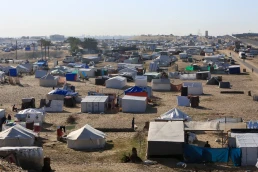A foreign affairs columnist called the move by the Biden administration a “shortsighted, morally unconscionable, and potentially calamitous decision for a country on the cusp of universal poverty.”
By Julia Conley, Common Dreams
Exactly a year after the Taliban seized control of Afghanistan’s government, the Biden administration said it would not return any of the $7 billion in Afghan central bank assets that it commandeered earlier this year, despite pleas from both human rights groups and economists to help pull the impoverished country out of its economic crisis.
As The Wall Street Journal reported Monday, U.S. envoy Tom Wolf told the newspaper that talks between the White House and the Taliban regarding the release of at least half the funds have ended, following the U.S. drone strike which killed al Qaeda leader Ayman al-Zawahiri.

U.S. officials say al-Zawahiri’s location near a Taliban official’s home shows that officials will not “manage assets responsibly” and will therefore withhold all of the funds as inflation and other factors push the prices of Afghan goods up by nearly 100% in some cases.
The U.S. had been considering placing $3.5 billion in a trust fund for Afghanistan to spend addressing its humanitarian crisis—with the other half of the money being set aside for the families of 9/11 victims, over the objections of some of those family members who believe all the money should be used to benefit Afghan civilians.
The U.S. has pledged more than $774 million in aid to Afghanistan over the past year, but economists including Shah Mehrabi, an economics professor at Montgomery College in Maryland and a board member of Da Afghanistan Bank (DAB), have warned that foreign humanitarian assistance “is not a solution” to the widespread suffering that has taken hold across the country.
“Many poor women and children will not be able to buy bread and other necessities of life,” Mehrabi told the Journal. “Those reserves belong to the central bank, and have to be used for monetary policy.”
Anti-war group CodePink added that while the U.S. has criticized the Taliban for keeping women out of government positions over the past year and shutting down schools for girls, withholding funds from the country only gives women “a harder time fighting for their rights.”
As the U.S. announced it had scrapped plans to return any of the seized funds, the International Rescue Committee (IRC) said 97% of the Afghan population is expected to live below the poverty line by the end of 2022 and more than 24 million people—nearly two-thirds of the population—are without enough food to eat each day.
The United Nations has estimated that more than 90% of people in Afghanistan lack sufficient food.
“With each week that goes by, more Afghans are forced to resort to the unimaginable to survive: that means skipping meals, taking on debt, pulling children out of school to save money–and even more extreme measures such as selling young daughters into marriage or selling organs,” said the IRC. “One woman recently told IRC staff that she is forced to pick food from the garbage and if she can get enough of the hair and dirt off, she brings it home for her six children. Otherwise they go days without eating.”
Considering the dire circumstances facing millions of Afghan people, Daniel DePetris of the foreign policy think tank Defense Priorities called the Biden administration’s decision “shortsighted, morally unconscionable, and potentially calamitous.”
The Biden administration has been rebuked by economists and human rights advocates for refusing to release the funds out of the stated fear that the money will go to supporting the Taliban instead of ordinary Afghans.
Michael Galant, secretariat of Progressive International, accused the White House of “starving the Afghan people to avoid a bad PR day” for President Joe Biden.
On “Last Week Tonight” Sunday, host John Oliver acknowledged that releasing the funds carries the risk of inadvertently funding the Taliban.
“The key question here isn’t just what happens if we send Afghanistan money and aid,” said Oliver. “It’s what happens if we don’t. And we know the answer to that: Millions of innocent Afghans will suffer and die under a government they did not choose.”
“The reality is, there is no one simple solution here that is without risk,” he added. “But 38 million people’s lives are at stake.”
Recent Posts
Why Are Democratic Lawmakers Still Meeting With Netanyahu?
July 12, 2025
Take Action Now Pictures show Democrats like Chuck Schumer standing next to Netanyahu, smiling.By Sharon Zhang, Truthout A bipartisan group of…
Stop Israel’s Dystopian “Humanitarian City” Plan—Before It’s Too Late
July 11, 2025
Take Action Now For the past 20 months, the world has watched—and largely enabled—a genocidal campaign in Gaza. Over 55,000 Palestinians have been…
The “Liberal” International Order Is Criminalizing Palestine Protests
July 11, 2025
Take Action Now As Western governments repress Palestine solidarity and enable Israel’s impunity, the “liberal international order” is no longer…
Politicians Are Betraying Gen Z On Climate
July 10, 2025
Take Action Now While Gen-Zers thrift, knit, crochet, and find other ways to reduce our footprints, Trump and the GOP are greenlighting more climate…




